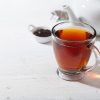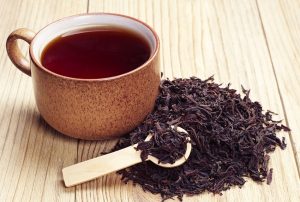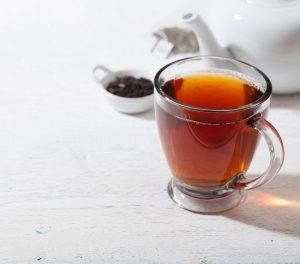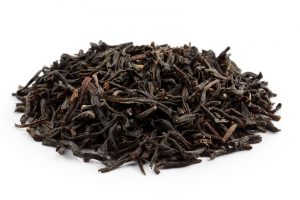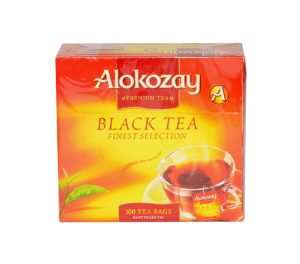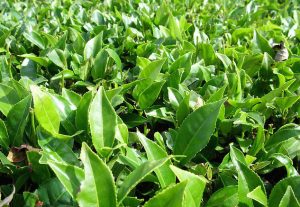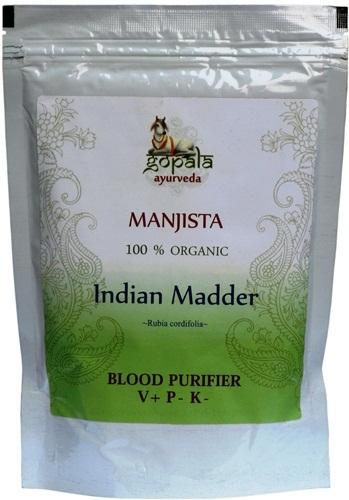Black Tea
Black tea, belonging to the same group as the green, white and oolong teas is the most oxidized of the lot, prepared from the leaves of Camellia sinensis, an evergreen shrub. Though in Chinese, Japanese, Assamese, and Bengali, black tea means red tea in their respective languages perhaps to signify a decoction that is more fermented, in English, however, red tea is more commonly referred to the rooibos tea found in South Africa. When it comes to utility, this fully fermented tea has a lot of health benefits to offer.
History and Origin
Black tea is said to have originated in China in the 16th century during the reign of the Ming dynasty, where it would often be referred to as hong cha translating to red tea. The first of the black teas produced in China was the Lapsang Souchong, deriving their name from Lapsang, the mountainous region where they grew and Souchong, meaning tea trees with small leaves.
Its popularity spread to European countries when the latter traveled to China during the 17th century. As per records, the Dutch merchants were the first to carry along with them black tea on their return journey from China. Initially, the tea confined to the aristocratic class because of the exorbitant prices. During British rule in India, black tea saplings were brought from China and planted in Darjeeling. A variety of black tea also grew in the lowlands in Assam that were stronger than the Chinese kind, mostly harvested and consumed by the locals. In spite of the recent popularity of green tea, this decoction.
Does black tea have caffeine
Black tea has a considerable amount of caffeine. However, if you do not want so much of it in your beverage, you should brew it for a lesser time. Of the different brands, the ones with low caffeine content include Lipton Decaf, Lipton Regular, Twinings Earl Grey, and Twinings English Breakfast, on the other hand, varieties like Tazo Awake, and Two Leaves and a Bud Darjeeling Tea are high on caffeine.
How much caffeine does black tea contain
Black tea has the highest amount of caffeine in comparison to green or oolong tea, with 8 ounces of brewed black tea having about 14 to 70 mg of caffeine (depending on the time for which it has been steeped).
Caffeine in black tea vs. caffeine in coffee: Which is better
The tea leaves are said to contain a higher amount of caffeine in comparison to the coffee beans, before the brewing process. However, when steeped or brewed, the leaves are strained, and some of the caffeine is left there, hence making coffee more stimulating than the tea. In comparison to black teas caffeine content (14 to 70 mg in 1 ounce), 8 ounce of coffee has 95 to 200 mg of caffeine.
Green tea vs. Black tea
Though both are made from the same plant’s leaves, there are some significant differences between the two.
- Black tea has been prepared through the process of fermentation where the leaves are rolled and then exposed in the open. Green tea is unfermented, with leaves being pan fried.
- Because of fermentation black tea has a darker color, while the green tea is light-shaded.
- Black tea has an increased proportion of caffeine in comparison to green tea.
- Green tea has stronger antioxidant properties in comparison to black tea as the latter goes through the process of oxidation while the former does not.
However, both the teas are equally beneficial when it comes to providing a host of health benefits including maintaining your heart or brain health as well as relieving stress.
Health benefits of drinking black tea: What is it good for
For heart health
Though the flavonoid (an antioxidant) content in black tea is not as strong as green tea, it is still sufficient enough to maintain a healthy heart and lessen the chances of cardiac ailments. According to a particular study, those having at least 3 cups of black tea on a routine basis were at a lessened risk of cardiac diseases at about 11%. Drinking black tea on a regular basis is also said to help in reducing the LDL or black cholesterol and even control blood pressure, all of which are essential factors in developing heart ailments. One finding deduced that consuming black tea regularly helped to reduce systolic as well as diastolic pressure while another research mentioned that those having about five servings of this decoction each day would experience a decrease in their cholesterol levels by about 11%.
Facilitates weight loss
Black tea is extremely low in calories as 100 grams of the tea contains just 1 gram of it, thus being a healthy drink for those who are intending to shed off the extra carbs. Black tea is also said to contribute in maintaining gut health because of its anti-microbial properties and presence of polyphenols which encourages good bacterial growth and inhibits the bad ones, which is also significant in facilitating weight loss. According to the latest research, black tea through some particular process helps in making the gut microbiome anti-obesogenic, thus contributing towards weight loss.
For a healthy stomach
Black tea is high in tannins and also has anti-inflammatory properties which make it beneficial in maintaining the digestive health and treating a lot of stomach problems.
In providing relief from gastritis
Though often said that drinking a lot of caffeinated beverages could alleviate gastric troubles, recent findings have a different notion. It has been shown that black tea consumption could reduce the risk of being affected by an H pylori infection, the bacteria which is mostly responsible for causing gastric troubles and acidity. Two separate studies also mentioned about the anti-ulcerative properties of black tea, thus being a boon for those with gastric ulcers.
Maintains bone health
The presence of theaflavins, a kind of phytochemical present in black tea which provides it with anti-inflammatory properties, is helpful in fighting free radicals that may result in oxidative stress, hence lessening chances of osteoporosis, fractures, and all other bone-related concerns. A study concluded that senior women drinking black tea on a regular basis were at a lessened risk of suffering from fractures.
Anti-diabetic properties
Like green tea black tea is also good for diabetes since the presence of several compounds, notably, a catechin named epigallocatechin gallate is said to bring in an improvement in the levels of insulin as per a study. Another animal study conducted on mice also exhibited the role of black tea in lowering the sugar levels in the blood, alongside improving the manner in which the body metabolized sugar.
Reduces puffy eyes
Because of the high amounts of tannin, alongside having analgesic, anti-inflammatory, and anti-bacterial properties, black tea is effective in treating puffy eyes as well as lessening irritation and swelling. Besides drinking the tea, you can also get immediate relief by applying the cooled decoction gently using a cotton swab or balls under your eyes or to the affected areas.
Relieves constipation
Black tea, be it hot or iced, is high in caffeine and has laxative properties, which therefore makes it useful for those troubled with constipation. Drinking it in the morning in an empty stomach might help in stimulating your bowel movements. However, avoid overconsumption as that could lead to an upset stomach.
For hair care
Black tea containing a significant amount of caffeine is effective in maintaining soft, shiny hair as well as helping in its proper growth. The presence of caffeine helps to block the Dihydrotestosterone or DHT hormone which is responsible for bringing in hair loss. Drinking black tea on a regular basis would certainly help in keeping your hair follicles healthy and prevent them from shedding. However, you can even apply the cool tea which has been steeped overnight on your hair and rinse it well.
Benefits the skin
Black tea works wonders for skin since they are high in polyphenol, an antioxidant, which help to neutralize the free radicals, thus preventing the skin from aging untimely. Besides this, the presence of tannins is an added boon as they too possess mild antioxidant properties, helping to maintain a clean, shiny and glowing skin, alongside preventing pimples and irritations of any kind. Having a cup of black tea on a routine basis would positively contribute towards your skin health. You can even apply it topically as a face mask or moisturizer to get relief from acne or pimples or add it to your bath water if you are being troubled by sunburn.
Boosts energy
The caffeine in the tea again does the wonder, making it effective in boosting your energy and making you feel refreshed throughout the day.
Acts as a stress reliever
Besides making you feel energetic, the tea also acts as a great stress reliever, helping in uplifting your mood, even making you feel more calm and relaxed. Several kinds of research and findings have shown that drinking black tea on regular basis aid in bringing down the levels of cortisol, the hormone responsible for inducing stress. Black tea also contains the amino acid, l theanine, though not as much as green tea, thus being useful in promoting mental alertness and focus.
As a diuretic
Because of its caffeine content, black tea serves as a mild diuretic, acting as a detoxifier and flushing out the toxins from the body, keeping you healthy. The fact that drinking tea can make you dehydrated is not entirely correct as it contains 99% of water and keeps your body hydrated by making up for the lost fluid. However, you must still avoid drinking too much of it mainly before bedtime as that could make you go to the bathroom often.
Anti-allergic properties
The presence of theaflavins in black tea might help in minimizing allergic responses in those having a sensitive skin. Animal studies conducted have also validated the same.
How to make or brew black tea
Ingredients
- Water (6 ounces for 2-3 grams of black tea leaves)
- Black tea leaves (2-3 grams or a teaspoon)
- Kettle
- Strainer
- Teapot
- Milk, lemon, sugar (optional for taste)
Instructions
- Boil the water to a temperature of 200° to 212°F, though certain black tea varieties which are delicate like First Flush Darjeeling Tea needs a lesser temperature of about 180 to 190°F.
- Pour a little amount of it into a cup and pour it out when the utensil has turned warm.
- Add the tea leaves
- Pour the water on the leaves
- Cover the cup or teapot and steep for three to five minutes
- Strain the tea and serve hot
To make black iced tea, you need to add ice cubes or cool and refrigerate the decoction once steeped.
How to make black tea with milk
Ingredients
- Water (6 ounces for 2-3 grams of black tea leaves)
- Black tea leaves (2-3 grams or a teaspoon)
- Kettle
- Strainer
- Teapot
- Milk, lemon, sugar (optional for taste)
Instructions
- Add a black tea bag or leaves to your cup (one teaspoon)
- Pour boiling water over the bag or leaves
- Steep for 3 to 5 minutes
- Boil about half a cup milk, and you may use a frother for a foamy effect.
- Take out the tea bag or strain the leaves.
- Add the milk to the cup
- Honey or sugar may be included for sweetness
Safety Precautions
Side effects
Though black tea has no known side effects, over-consumption could lead to a headache, vomiting, nausea or an upset stomach.
Because of its high oxalate content overconsumption may lead to kidney stones. If you are allergic to red wine or grapes, this means that tannins do not go down well in your system, hence under such circumstance, it is better to avoid black tea.
Is black tea safe during pregnancy
Black tea is considered safe during pregnancy if taken in measured amounts, though an increased intake could lead to a whole lot of health hazards since it contains caffeine. As per studies consumption of about 200 milligrams, caffeine on a daily basis could bring in miscarriage. So it is necessary to keep a check on how much of the tea you have if you are consuming other caffeinated products along with it.
Nursing mothers should avoid drinking black tea or any caffeinated beverage before breastfeeding to prevent the caffeine from going into the breast milk. Instead, it is better to drink it after feeing as babies of mothers who are high on caffeine are often fussy and have sleep disorders.
Where to buy
You can get black tea online or in stores sharing herbal and non-herbal beverages. Darjeeling Black tea, Assam Black tea, Irish Breakfast tea, Earl Grey Black tea, and Pekoe cut Black tea are the popular brands available as leaves or even in the form of tea bags. You would also get black tea in an array of flavors like black vanilla tea, mango black tea, lemon black tea, black iced tea mix and much more.
References
- https://www.thespruceeats.com/introduction-to-black-tea-766429
- https://www.lifehack.org/articles/lifestyle/11-benefits-black-tea.html
- https://www.healthline.com/nutrition/black-tea-benefits
- https://www.webmd.com/vitamins-and-supplements/black-tea-uses-and-risks#1
- https://www.medicalnewstoday.com/articles/319646.php
- https://timesofindia.indiatimes.com/life-style/health-fitness/diet/Health-benefits-of-black-tea/articleshow/8508759.cms
Article was last reviewed on 23rd December 2022
Related Articles
Leave a Reply
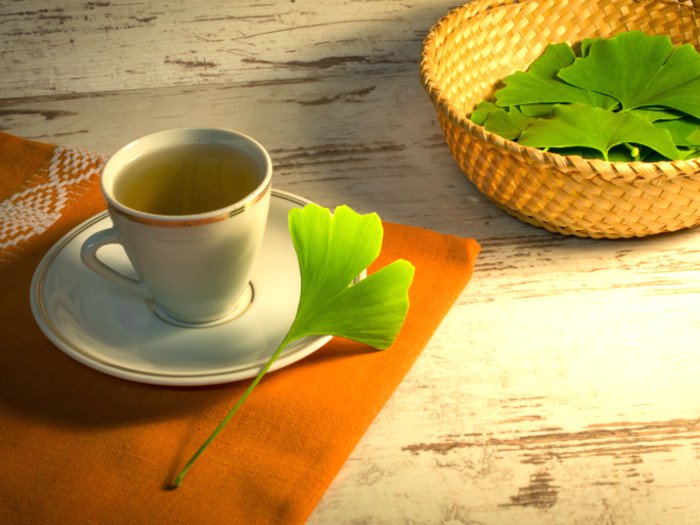
Ginkgo Biloba Tea
The Ginkgo Biloba tea is an herbal infusion obtained from the extract of the dried leaves
Read more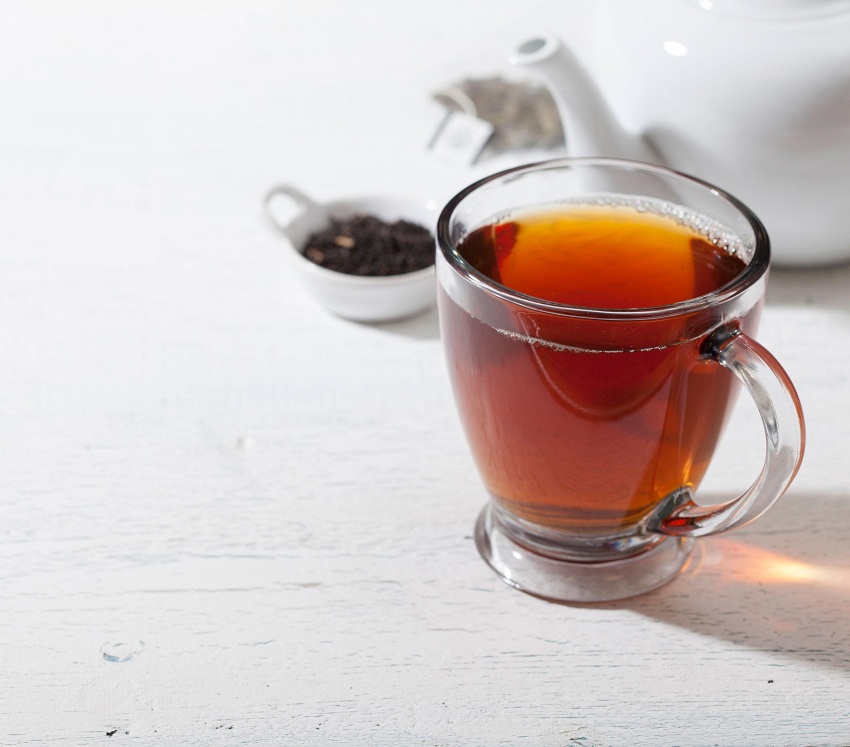
Black Tea
Black tea, belonging to the same group as the green, white and oolong teas is the most oxi
Read more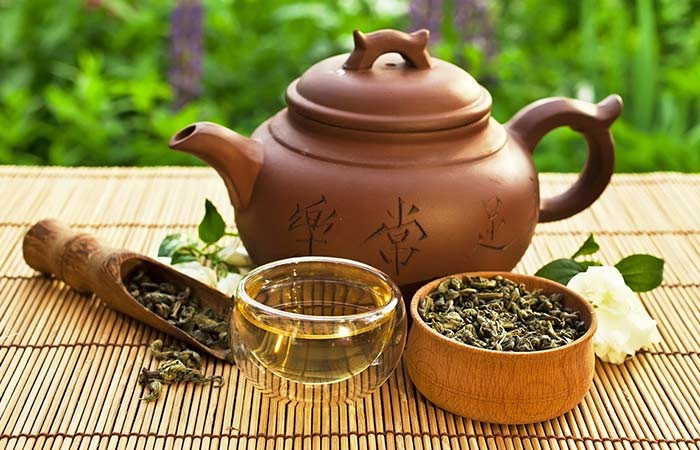
Oolong Tea
What is oolong tea Oolong, a traditional beverage of China, is prepared from the buds, st
Read more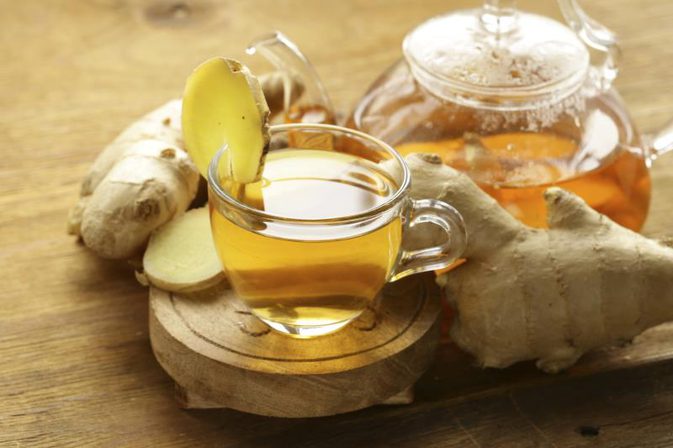
Ginger Tea
Ginger tea, prepared from the roots of ginger, is a popular herbal beverage of Asia. Becau
Read more
